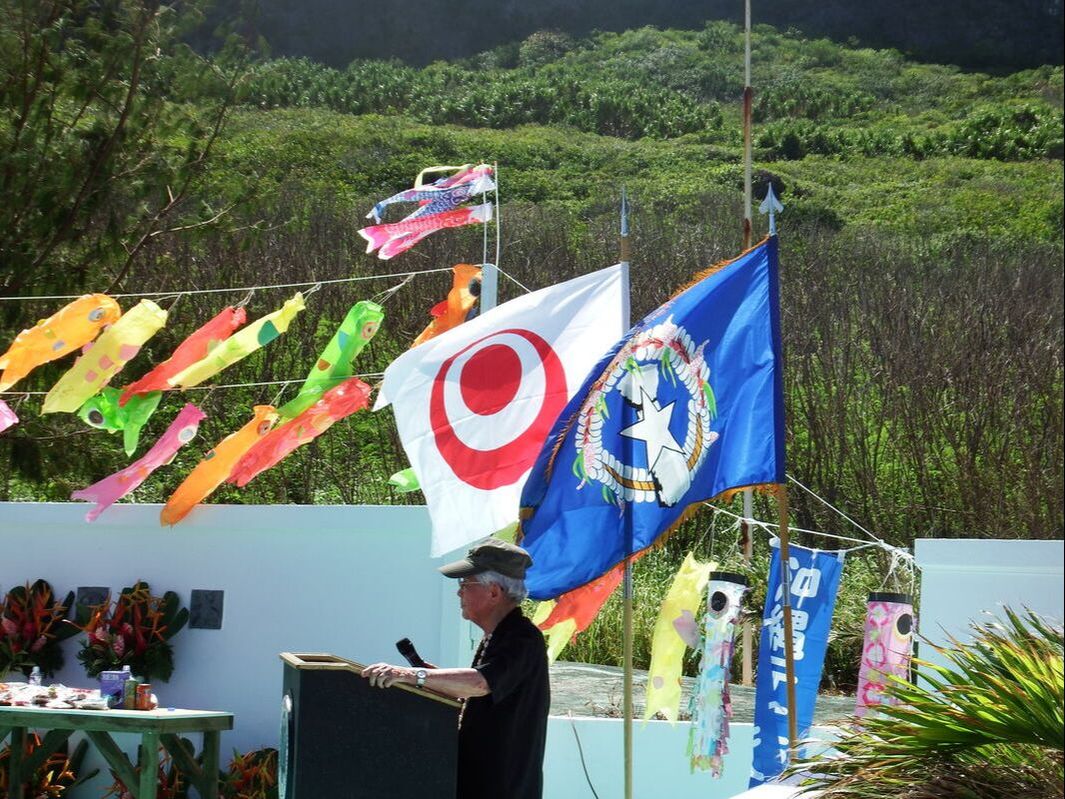|
|
|
In 2014, at his house located in central Okinawa, Kiyoshi Takamiyagi reminisced about his childhood in Saipan, the former mandate territory of Imperial Japan, today the main island of the Commonwealth of the Northern Mariana Islands (CNMI), a US unincorporated territory. Takamiyagi was born and raised in Saipan as a son of a colonial migrant worker on a sugarcane plantation. He spoke about the social hierarchy in the colony, where the Japanese government officials and corporate executives were regarded as first-class citizens (ittō kokumin), Okinawans and Koreans as second-class citizens (nitō kokumin) and the indigenous islanders as third-class citizens (santō kokumin). He then tearfully recalled his family’s suffering during the Battles of the Marianas in 1944, in which some 44,000 Japanese soldiers, 10,000 Japanese civilians (more than half of whom were Okinawans) and an estimated 1,000 Koreans and indigenous islanders were killed. During the battle, Takamiyagi, then a young boy, witnessed the brutal firebombing deaths of his father, younger brother and two younger sisters. The 82-year-old man then caught me by surprise: 'I loved Saipan. I miss Saipan. In fact, I have visited there four times, most recently three years ago' (Takamiyagi 2013, interview).
In 2013, I visited the home of Marta Diaz Muna-Mendiola, an indigenous islander in her late 80s, in Saipan. She shared her childhood memories during the Japanese mandate era, which the locals call ‘Japan time’. She went to Japanese government-run public schools for indigenous islanders, where she learned the Japanese language, sewing, abacus, farming and vocational skills. Muna-Mendiola sprinkled her responses in English and the indigenous Chamorro language with clearly enunciated Japanese words – rattling off the names of Japanese-owned stores she frequented as a child and her Japanese homeroom teacher’s name – and broke into singing Japanese children’s songs. Every time I asked her about her childhood under Japanese rule, she insisted, in Japanese: 'It was great [yokatta desuyo] … We experienced no hardship [Kurou shinakatta desuyo]' (Muna-Mendiola 2013, interview).
In reality, Japanese colonial rule over Micronesia was hardly benevolent for Okinawan colonial migrants or indigenous islanders (Camacho 2011; Poyer et al. 2001, 2008; Spoehr 1954). The colonial rule and mass migration of the Japanese, Okinawans and Koreans to the islands displaced the local Chamorro and Carolinian Islanders, while all upper-level administrative jobs in the colonial government and Japanese businesses were reserved for Japanese mainlanders. It was striking for me, therefore, to observe the shared nostalgia among the former colonial migrants and the colonised islanders. This study, as discussed in my Identities article, 'Transcultural nostalgia for the colonial past: intersecting memories among Okinawans and the Northern Mariana Islanders', examines how the two social groups formed an intersecting longing for the past.
How do different cultural groups forge a shared longing for the past, or transcultural nostalgia? My Identities article suggests that each group’s past and present political-economic conditions are key contributors to transcultural nostalgia. It also illustrates that travel between spaces and encounters during the travel are a key means of transcultural remembering among two different groups. The article historically and ethnographically examines the transcultural nostalgia among Okinawans who had migrated to the Northern Mariana Islands under the Japanese rule and repatriated after WWII, and the indigenous islanders who had grown up as Japanese colonial subjects, as well as the repatriates’ post-war ‘spirit-consoling’ pilgrimages to the Marianas. References: Camacho, K.L. 2011. Cultures of commemoration: the politics of war, memory, and history in the Mariana Islands. Honolulu: University of Hawai‘i Press. Poyer, L., S. Falgout and L.M. Carucci. 2001. The typhoon of war: Micronesian experiences of the Pacific War. Honolulu: University of Hawai‘i Press. Poyer, L., S. Falgout & L.M. Carucci. 2008. Memories of war: Micronesians in the Pacific War. Honolulu: University of Hawai‘i Press. Spoehr, A. 1954. Saipan: the ethnology of a war-devastated island. Chicago: Chicago Natural History Museum.
Blog post by Taku Suzuki, Denison University, USA
Read the full article: Suzuki, Taku. Transcultural nostalgia for the colonial past: intersecting memories among Okinawans and the Northern Mariana Islanders. Identities: Global Studies in Culture and Power. DOI: 10.1080/1070289X.2019.1686879
0 Comments
Your comment will be posted after it is approved.
Leave a Reply. |
|
Explore Identities at tandfonline.com/GIDE |
|
The views and opinions expressed on The Identities Blog are solely those of the original blog post authors, and not of the journal, Taylor & Francis Group or the University of Glasgow.

